Alexander the Great was one of the greatest warriors in the history of humanity. He became the King of Macedonia at the mere age of twenty and almost succeeded in conquering the entire known world. In this article, we will discuss the conquests of Alexander, which spanned twelve years, 22,000 miles, and covered the territories known to be Greece, Turkey, Lebanon, Egypt, Iraq, Iran, and Pakistan. Alexander left a grand legacy that was controversial yet was endured and acknowledged by the entire world.
Who was Alexander?
Alexander the Great was one of the most romantic figures in history; he was so compelling that people have been captivated by him for thousands of years. Alexander was born in 356 BC to the Macedonian King Philips and one of his foreign wives Olympus. Numerous mythical stories surround Alexander’s birth. Many people, including his mother, believed that he was the son of the divine god Zeus.

Alexander was tutored by the Great Philosopher Aristotle who was well-versed in history, literature, geography, mathematics, and medicine from the beginning of his teenage years. Aristotle encouraged Alexander’s vision to conqueror over Persia and further continue his reign through the east. Alexander developed numerous great qualities during his teen years due to Aristotle’s teaching, including ambition, generosity, thoughtfulness, and battle tactics such as planning and strategizing.
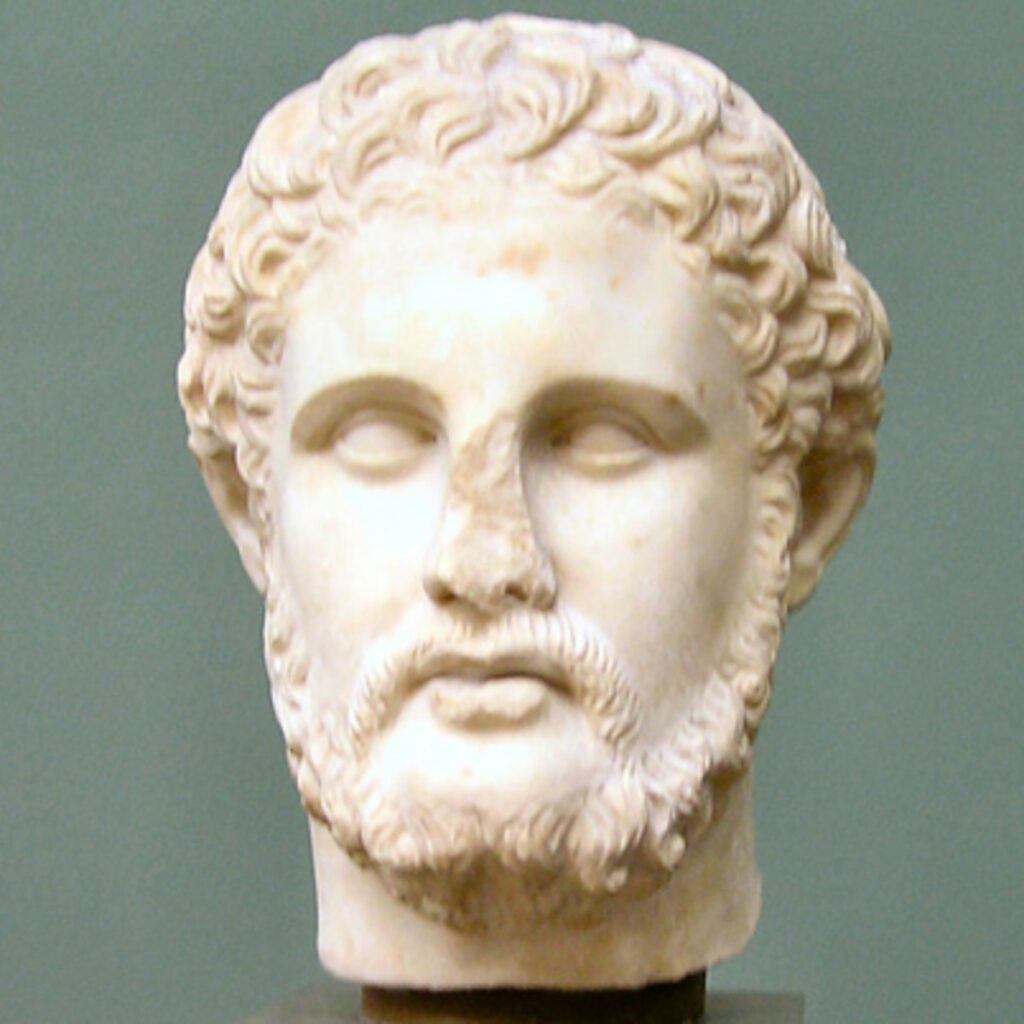
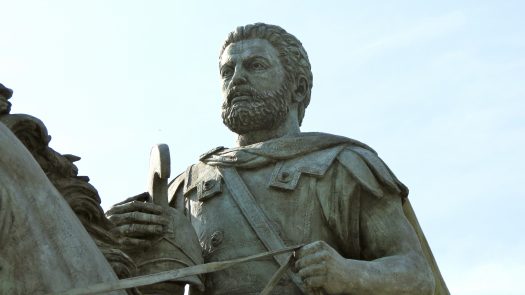
King Philip II Alexander’s Father.
Alexander’s father, King Philips, ruled Macedonia, which was considered by other Greeks as inferior and barbarian culture. He grew up witnessing his father turn Macedonia into a major military power, gaining victory after victory on battlefields. At the age of twelve, Alexander demonstrated his capabilities to the Macedonians by controlling a furious and unstable horse that several soldiers attempted to tame. He named the horse Bucephalus and rode him through several battles to build his mighty empire for nearly two decades. Soon Alexander was left in command of Macedonia during Philip’s invasion of Byzantium in 340; he took advantage of the opportunity to prove himself by defeating the Maedi, a Thracian people.
Alexander comes in power
In 336, due to some conspiracy, King Philip was murdered by his local guards. Alexander, after the grief, soon took over the throne and went on a killing spree as revenge for his father’s death. Once he had avenged his father’s death, he secured his future by taking out potential rivals. As a result, Alexander executed his half-brother Carano and cousin Amintas the IV. Meanwhile, his ruthless mother Olympias had assassinated King Philip’s last wife and her daughter Europa for the crime of murdering King Philip.
Then, Alexander turned towards his neighboring territories by launching a rapid campaign. Almost all of Greece bent the keen and accepted Alexander as their new leader in a few weeks. Within six months, Alexander gained a significant amount of control over the entire Greece and earned the respect of his troops by decisive actions.
Conquering Persia and the Battle of Issus

Alexander had been aware of the Persians’ dominance, wealth, and cruelty since he was a child. He had long wished to conquer Persia, not only for the wealth and prosperity it would bring him but also for the honor he would acquire by defeating the biggest rival of the Greece Empire. With an army of 25,000 Macedonians, 7,600 Greeks, and other troops of Greek allies, he heads to conquer the mighty Persian empire. In the fall of 333 BC, the Macedonian army’s confronted the Persian forces under the leadership of King Darius III himself in a mountain pass near Issus in northeastern Syria.
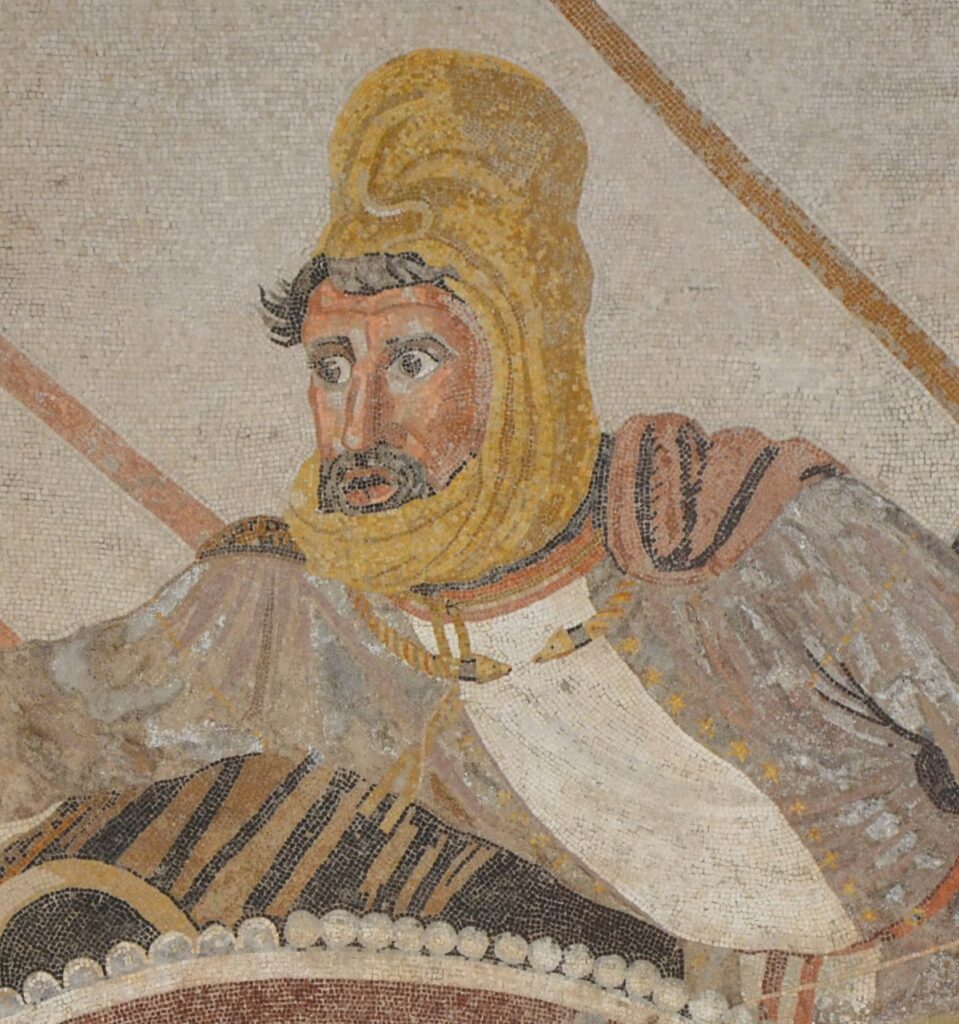
King Darius III 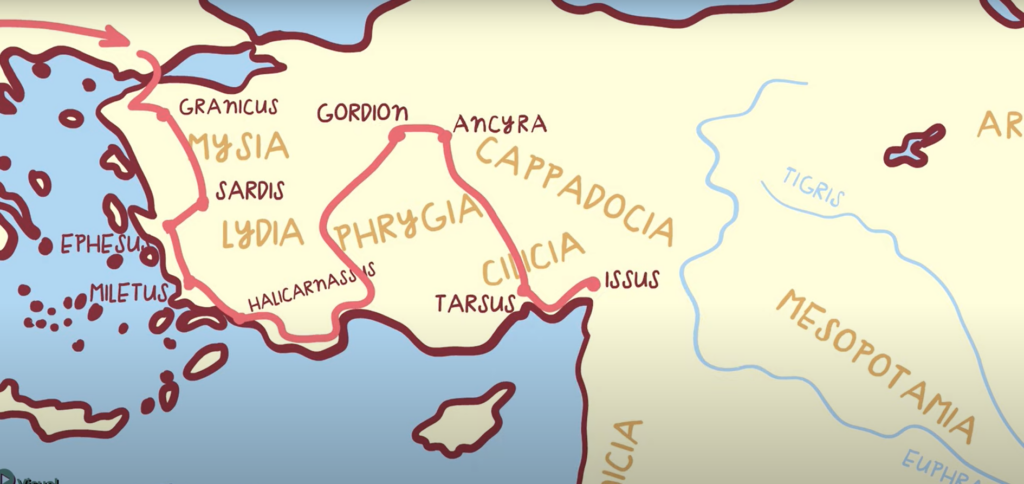
Alexander and his men were greatly outnumbered against the mighty army of Persians, but with their willpower, determination, and battle tactics, they fought and defeated King Darius’ army. When King Darius III saw his loss at the Battle of Issus, he fled in terror, leaving behind his mother, wife, and children. Then, witnessing the courageous Alexander, King Darius’ mother regarded him as her son, and Alexander, in turn, treated them with respect out of consideration for their royalty.
Sieges of Tyre and Gaza

The conquest of Issus paved the way for Syria and Phoenicia to follow. Early in 332, Alexander dispatched General Parmenio to seize Syrian cities. He subsequently marched along the Mediterranean coast, where he received the surrender of all critical cities except the island city of Tyre, which refused to allow him entrance. The Macedonians began digging a mole to connect the island city to the coast to get into the island. Tons of rocks and timber were dumped in the strip of sea, cutting the island from the coast, but its construction and the repeated attacks of the city wall cost the death of Alexander’s many men.
After months of fighting, the Macedonians eventually conquered the island; they unleashed their rage on the city defences, killing 7,000 people and selling 30,000 as slaves. Alexander received a plea from King Darius, who was willing to give several western provinces of the Persian Empire; Alexander rejected the offer and took the towns of Byblos and Sidon. He continued marching south into Egypt but was again stymied at Gaza. The Macedonians besieged the city for two months, after which the Tyre scenario was repeated. With the fall of Gaza, the Macedonians now had control of the whole Eastern Mediterranean coast.
Alexander enters Egypt

After these glorious victories and numerous conquests, Alexander was already named the Kings of Kings. Alexander then entered Egypt to liberate its ancient civilization from the Persian yoke. After passing through palazzo or Memphis, Alexander was proclaimed as Pharaoh(supreme leader). Years later, with the rise to power of his general Ptolemy, a new dynasty called the Ptolemaic dynasty of Macedonian origin would rule the fate of Egypt for the next three centuries. To win over his people, his priests, and even his gods’ Alexander made a stop at the Siwa oasis to visit the oracle of Ammon that proclaimed his divine origin.
The Macedonians tried not to impose too much change in Egypt and did not alter its provincial divisions or traditions. Though in the Nile delta off the coast, he founded Alexandria in 331 BC, a city named after himself conceived from its origin as the best showcase for the west of Egypt’s richness and cultural and economic splendor. Alexandria soon became one of the most important cities not only in Egypt but throughout the ancient world.
Alexander becomes King of Persia

Taking advantage of Alexander’s stay in Egypt, the Persian King Darius III rebuilt a massive army to fight for revenge against Alexander. Despite King Darius’ army’s numerical superiority, he faced a humiliating defeat in the Battle of Gaugamela in October 331 B.C. This battle confirms the end of the Persian empire and a new start of Alexander’s kingdom in Persia. King Darius, out of fear, continued to escape battles over battles until his own troops murdered him for his cowardness.
Alexander proclaimed himself King of Persia after finally disposing of Darius. However, another Persian ruler, Bessus (who was also supposed to be Darius’ murderer), claimed the Persian throne. Alexander pursued Bessus relentlessly, and his troops brought him over to Ptolemy, Alexander’s close friend, where he was mutilated and murdered. Now that Bessus had been defeated, Alexander had complete control of Persia.
Invasion of India
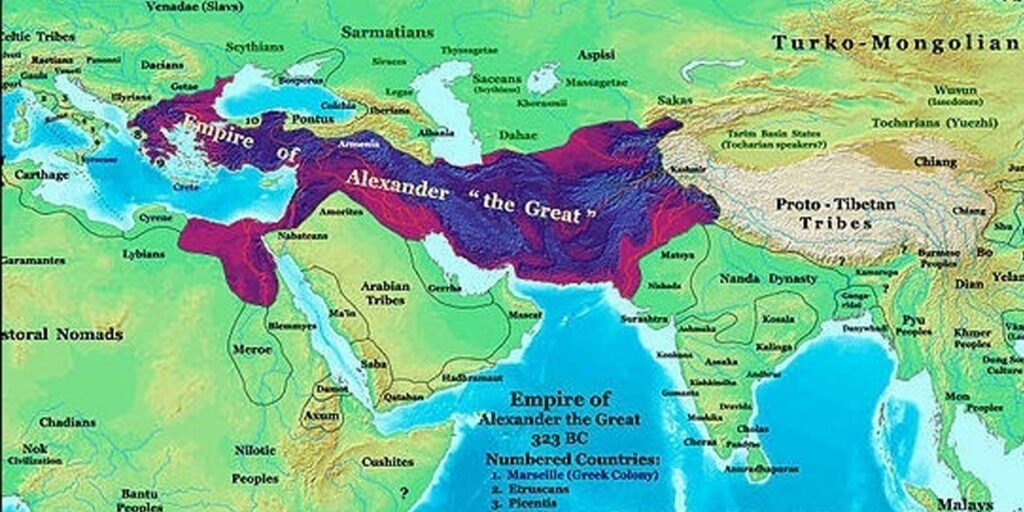

Alexander invasion of India
In 327 BC, Alexander and his army marched towards India, where he faced many unknown challenges. Unlike the Persian empire, India at that time lacked centralized power and was divided by many kings and kingdoms. He penetrated the Indus valley and crossed the Jhelum river, where he defeated local kingdoms and continued his march further into India. The Greatest of Alexander’s conflicts in India took place on the banks of the Hydaspes River against King Porus, one of India’s most powerful rulers.
In 326 BC, Alexander’s army crossed the heavily guarded river to meet Porus’ men during a drenching rain. The Indians were defeated in a brutal battle, even though they fought with unique war elephants, something the Macedonians had never seen before. King Porus gave a tough fight in the Battle of the Hydaspes, where Alexander’s horse Bucephalus was brutally injured and died. King Porus was captured, and like the other local rulers he had defeated, Alexander permitted him to continue to govern his realm.

Due to the death of his companion and beloved horse, Alexander was in grief. Though he had visioned to move on further and seek to conquer all of India, his war-weary army refused, and his officers urged him to return to Persia. So Alexander marched his forces down the Indus River where he was severely wounded during a battle with the Malli.
Death of Alexander the Great
In 324 BC, Alexander was back in Persepolis, and in 323, he had settled in Babylon. He began numerous works in this city to fill the city with majestic new monuments that illustrated his greatness, engraving his name in stone for all eternity in that city. Further to encourage unity between the Greek and Persian Alexander and 80 of his close companions married Persian noblewomen. In addition, he legitimized so-called prior weddings between soldiers and native women and gave them costly wedding gifts, no doubt to encourage such partnerships.

With the addition of more military power and territory, Alexander was planning the Arabian campaign. But he will never see this happen as he died on the night of June 10th, 323 BC, of an unknown disease at the age of 32. The death of Alexander has been one of the mysterious death of ancient history; many say that he died due to malaria, which he caught during his campaign of India; other hypotheses claim that he was poisoned by one of his close people. The death of Alexander had a significant impact on the entire world. The history of Ancient Greece begins with the death of Alexander, which caused the fall of his empire and the start of the Hellenistic period.
Conclusion
Alexander the Great was a prominent conqueror, warrior, soldier, a general but not a great leader or emperor. He knew how to conquer, kill and destroy, but he failed to build what he had destroyed. As a result, soon after his death, his vast empire consolidated into smaller dynasties or kingdoms mainly ruled by his generals. Nevertheless, Alexander almost succeeded in what he dreamt of as a child to form a gigantic empire that generated a universal character. Alexander the Great would inspire future leaders such as Caesar and Napolean Bonaparte.











Add comment